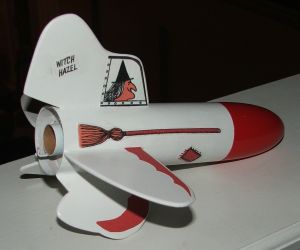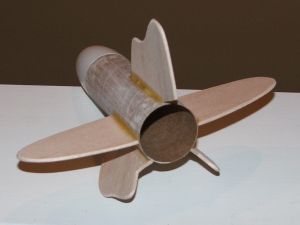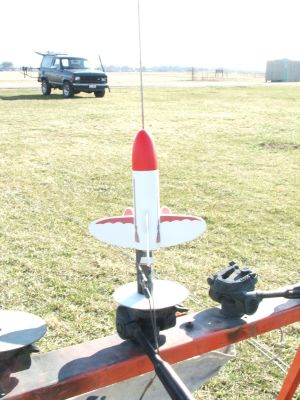| Construction Rating: | starstarstarstarstar_border |
| Flight Rating: | starstarstarstarstar_border |
| Overall Rating: | starstarstarstarstar_border |

Brief:
Although the Goonybirds had disappeared from the scene by the time I got into the hobby, I still managed to have my
life touched by these odd little rockets. I found a Goonybird Cloudhopper on the markdown table in a KayBee Toy and
Hobby. Even I could afford it at the markdown price ($0.75 or so), and it was too odd for me not to take a chance on
it. It was destroyed on its first flight but never quite forgotten, and all of the Goonys were among the first kit
instructions I copied when I discovered JimZ's plan site. I never owned Witch Hazel and her Zoom Broom as a kid, but
only because I didn't know she existed.
Construction:
Parts list:
- BT-60R main body tube (5.0")
- PNC-60L nose cone
- 18mm engine mount (from Baby Bertha kit)
- 3/32" fin stock
- launch lug
- 24" Kevlar® shock cord
- 24" sewing elastic shock cord
- 12" parachute
- medium snap swivel

All of the parts for this project were provided by an Estes Baby Bertha. It was necessary to take 2.5 inches off of the BT-60 included with the Baby Bertha kit, but other than that, everything but the fin stock gets used. I attached the fins with LocTite Gel CA, then used regular Elmer's Wood Glue for the fillets. The motor mount was constructed according to the instructions with wood glue, but a length of Kevlar® was first tied around the motor tube, glued into place, then slipped through a 1/4" slit that I cut in the forward centering ring. I then covered both sides of the cut with more wood glue, and once everything was dry, I installed the mount in the rocket.
Finishing:
All balsa grain and tube spirals were eliminated with the requisite thinned Elmer's Fill 'n' Finish and sanding. When
things looked smooth enough, I sprayed the entire rocket with Valspar primer. The body was sprayed with Valspar gloss
white while the nose cone got a coat of Valspar Cherry Red Gloss. Even without the decals, the painted Zoom Broom looks
cool, like one of the Gee Bee racing planes of the past. Keeping with the spirit of the original, I made a set of
decals using label paper. While this sounded like a good idea at first, the decals came out looking a little washed
out. A shot of clearcoat only served to wash them out further. There might be a self-stick paper out there that will
reproduce and hold the colors, but I haven't found it as of yet. That said, it might be worth it to print the decals on
inkjet decal paper. The finished product looks OK from a distance, but up close the decals have a dull, lifeless look
to them.
Construction Rating: 4 out of 5

Flight and Recovery:
First flight was on an A8-3 on a wind-whipped day at VOA. Since I went with the 18mm power and a stock tube length, I
found it necessary to cut away some of the nose cone base to gain some parachute packing room. I left enough to allow
for the attachment of the shock cord, but little else. The rocket wiggled badly from the moment that it left the rod.
This was probably a combination of the wind and a lack of nose weight, something that I had pretty much expected. What
I hadn't expected was that my modified nose cone might cause problems with chute deployment, and this was exactly what
happened. The chute stayed in the nose cone and the rocket did a free fall to the grass below, landing fairly softly
without damage.
Since the chute didn't deploy on the first flight, I decided to go without for the second flight. In the time between flights I had added nose weight to the nose cone in the form of BBs and epoxy. Second flight was on a B6-4 on a windy day. The first thing I noticed was the absolute lack of wiggle in this flight. I was also surprised by how straight the flight was in a fairly stiff breeze. The shock cord tangled after ejection, but the rocket fluttered down and landed softly in the wet grass without damage.
Flight Rating: 4 out of 5
Summary:
PROs: It's Goony. 18mm flights are noticeably quicker off the pad and higher. No need for a parachute unless you
figure on rough landings.
CONs: Sticker decals aren't worth trying. Just go with the regular decals. 18mm motor mount doesn't leave much room for a parachute.
Overall Rating: 4 out of 5
 |
 |
Flights
 |
 |
